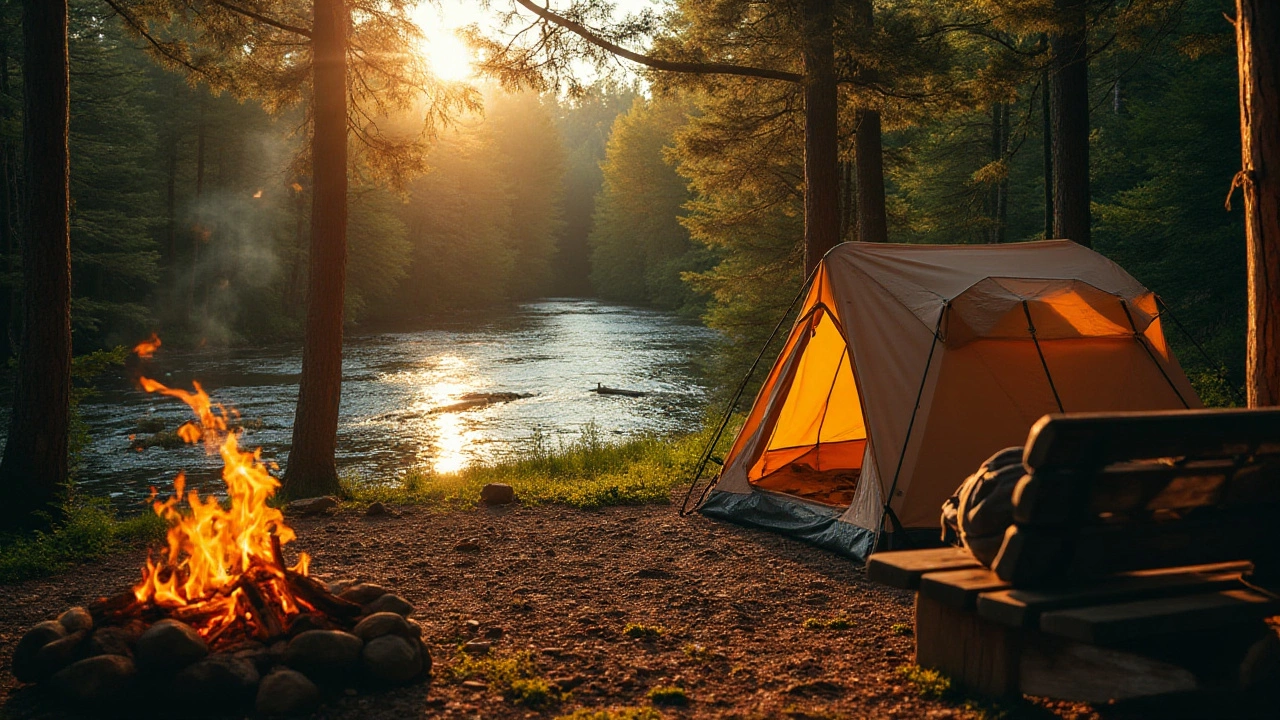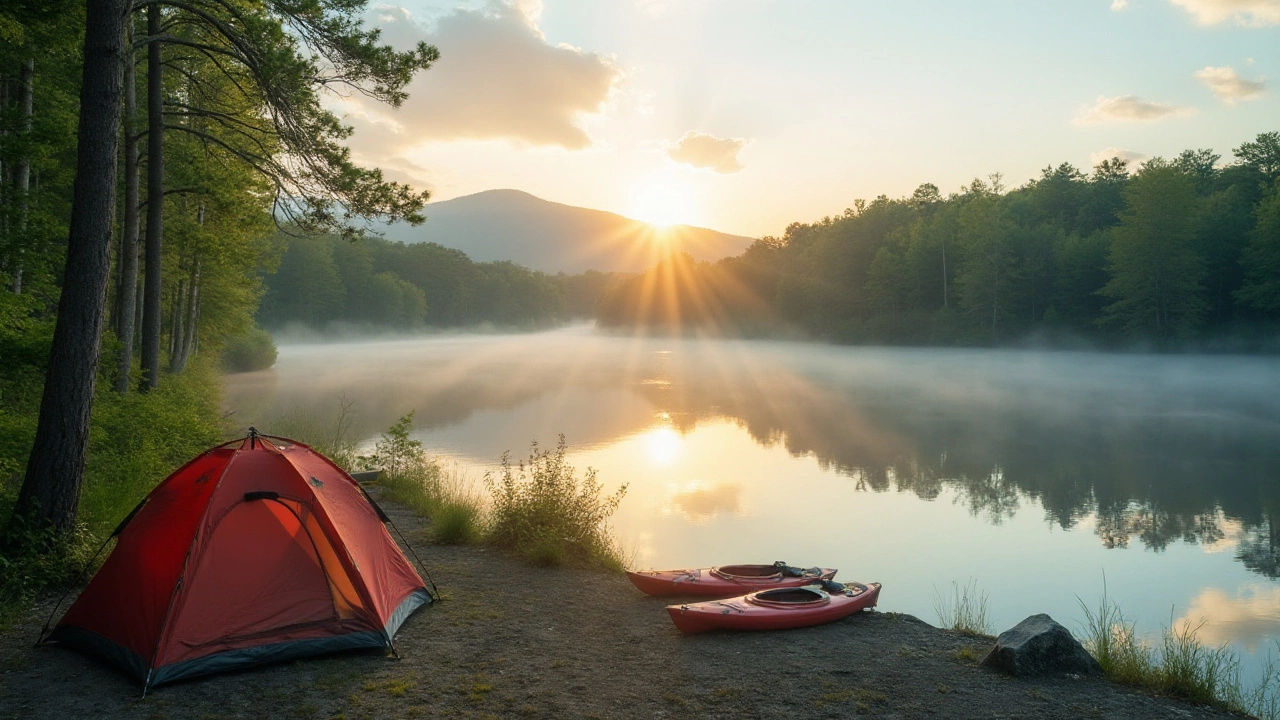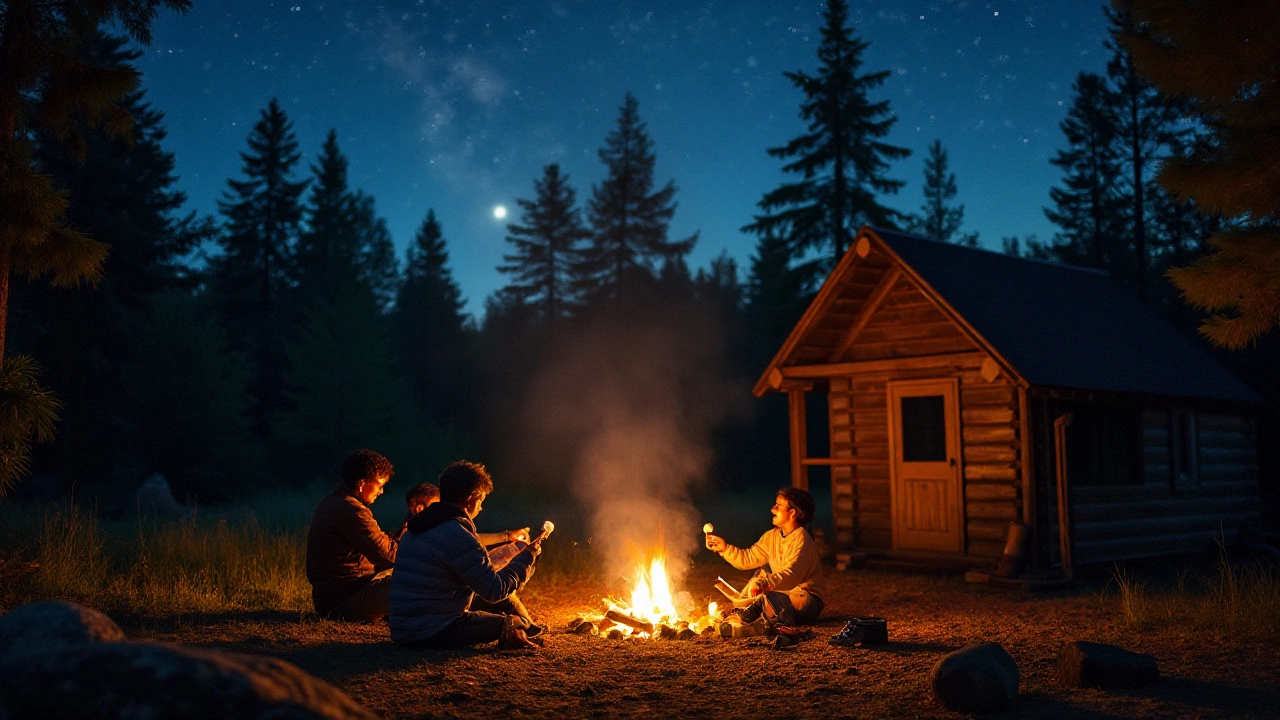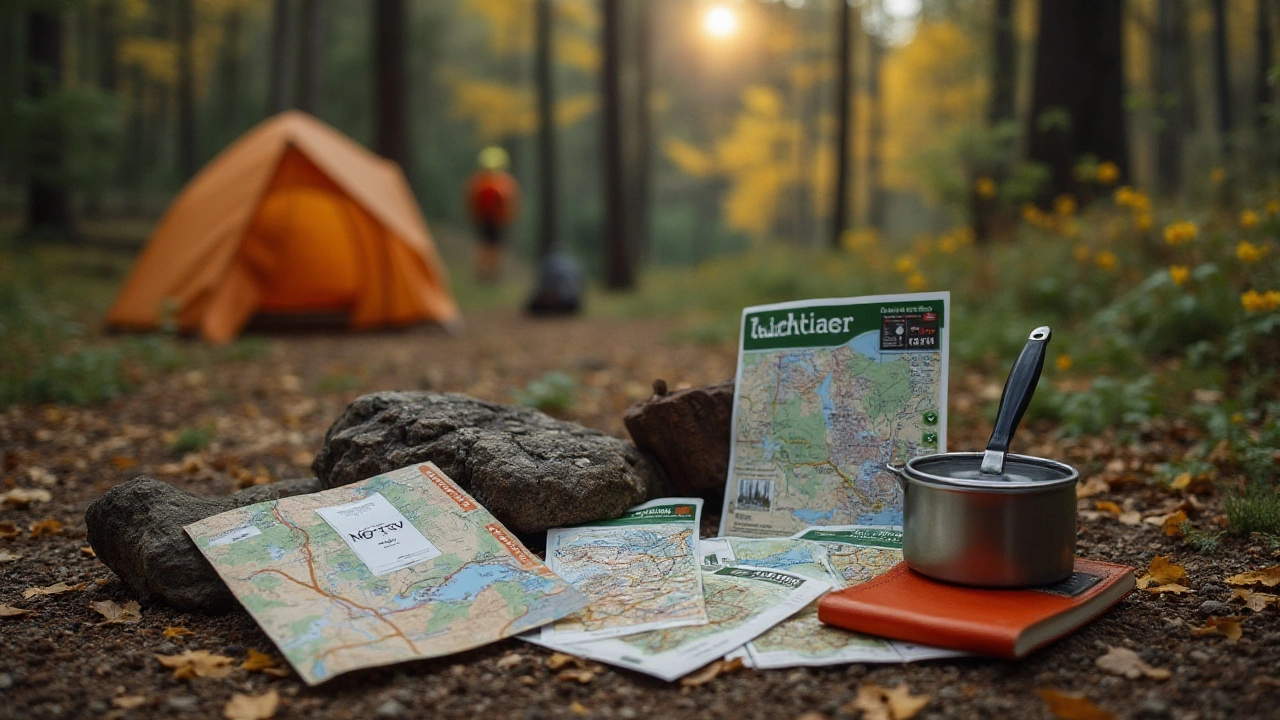Affordable Camping: Michigan State Forest Campground Costs Unveiled
 Nov, 28 2024
Nov, 28 2024
Camping in the heart of Michigan's vast state forests is a journey into the wonder of the wild without breaking the bank. These campgrounds provide a serene escape from urban life, nestled amidst lush trees and pristine landscapes that Michigan is famed for. But how much will a stay in one of these natural retreats set you back?
Whether you're a seasoned camper or new to the outdoors, navigating the cost of camping can be daunting. The price for staying at these campgrounds can vary, influenced by factors such as the campground's popularity, amenities offered, and the time of year.
This article explores the various expenses you might encounter while planning your rustic getaway, from permit fees to any unique charges that might surprise first-time visitors. We'll also tip you on how to enhance your camping experience without stretching your budget, making your time in Michigan's great outdoors both enjoyable and economical.
- Understanding Campground Costs
- Unique Features of Michigan State Forests
- Tips to Save Money on Your Trip
- Planning Your Visit: What You Need to Know
Understanding Campground Costs
When planning a camping trip in Michigan, it's essential to grasp the factors influencing costs at Michigan state forest campgrounds to manage your budget effectively. A typical campground fee ranges from about $10 to $25 per night, depending on the location and amenities available. While most forest campgrounds offer basic amenities like pit toilets and picnic tables, some sites provide additional comforts that can slightly increase costs. Location plays a crucial role; campgrounds situated near popular attractions or large lakes might charge more compared to those nestled in more secluded areas. Camping costs in Michigan are designed to be affordable, maintaining accessibility for families and solo adventurers alike.
A unique aspect of camping in Michigan forest campgrounds is the necessity of a Recreation Passport for all vehicles entering state parks or recreation areas. Introduced as a measure to support conservation efforts, this permit incurs a modest annual fee for local residents, around $18, and is priced higher for out-of-state visitors. This fee is a critical consideration for travelers, as it adds to the cost of your camping experience but contributes significantly to the upkeep of Michigan’s natural treasures.
Let's not overlook additional costs that might crop up, like firewood or special activity permits. Many campers opt to purchase firewood on-site rather than risk bringing in wood that might harm the local ecosystem. A bundle could cost about $5 to $10, depending on availability and location. It's a small price to pay to ensure Michigan's forests stay healthy and free from invasive pests. For those interested in activities such as ATV riding or hunting, separate permits and licenses might be required, accounting for extra cost in trip budgeting. Most importantly, these fees ensure that campers can enjoy an adventure-packed trip within the lush scenery that Michigan camping offers.
Occasionally, camping at Michigan state forests includes unexpected treasures. Some sites offer discounts for veterans or senior citizens, making an already budget-friendly trip even more affordable for some. Group discounts might also be available, inviting families and large friend groups to enjoy camping without heavy financial strain. Among the more unique aspects of state forest campsites is their attempt to strike a balance between being cost-effective and maintaining the environments they take place in. These efforts not only protect the lands but also create a sustainable model for future explorers who want to experience Michigan's boundless natural beauty.
According to the Michigan State Parks Reservation Website, "By purchasing a Recreation Passport, you’re contributing to environmental preservation and the beautification of our inviting natural areas."
Understanding these cost dynamics helps campers expect costs and motivates them to consider how these funds are utilized within the local ecosystems. For those planning their adventure, comprehending these elements leads to an enhanced appreciation of the camping experience and contributes to the ongoing sustainability and enjoyment of Michigan's state forest campgrounds.

Unique Features of Michigan State Forests
Michigan is blessed with a stunning array of state forests, each offering its own distinct charm and appeal to adventurers and nature lovers. The state's vast woodlands, interspersed with crystal-clear lakes and meandering rivers, bring a picturesque quality that draws campers from far and wide. What sets these Michigan camping spots apart is not just their beauty, but the diversity of landscapes they encompass. From the dense pines of the Huron-Manistee National Forests to the expansive, lush sceneries of the Ottawa and Hiawatha National Forests, variety is the spice of the Michigan outdoor experience. Each forest stands as a testament to the state's commitment to preserving natural habitats, fostering biodiversity, and providing havens for wildlife and plants alike.
Few states can boast the wildlife diversity that Michigan offers. As you explore the forest trails, it's not uncommon to spot deer, foxes, and a plethora of bird species, from the haunting call of the northern loons to the vibrant flash of a pileated woodpecker in flight. The state forests are also home to some rare inhabitants, such as the majestic bear and the elusive gray wolf, providing a firsthand look at nature's raw elegance. Each visit to these areas is likely to yield a different encounter, underscoring the dynamic nature of these ecosystems.
Another unique feature of Michigan's state forests is how they cater to a wide range of outdoor activities. Enthusiasts can indulge in fishing, hiking, bird-watching, and even snow sports during the colder months. The state forest campsites are scattered throughout the forests, offering everything from rugged backcountry spots to more developed areas with basic amenities to appeal to different preferences. This versatility ensures that whether you're a fan of primitive camping or seeking a more organized camping site, you'll find what you need here.
The management of Michigan's forests also includes a consideration for the recreational needs of the community, ensuring that facilities are maintained without compromising on conservation efforts. In many locations, local initiatives such as the "Leave No Trace" program are actively promoted, urging visitors to respect the natural environment and maintain the pristine condition of these wilderness areas. This balance between enjoyment and preservation is pivotal, as it helps sustain the natural beauty for future generations.
According to the Michigan Department of Natural Resources, "Our commitment isn't just about protecting resources, but also about enriching people's lives through outdoor experiences." This ethos aptly encapsulates the state's approach to managing its forest areas.
For those who desire a complete immersion into nature, Michigan's state forests provide an unrivaled escape. The opportunity to disconnect from the hustle of everyday life and rekindle a connection with nature is something that truly makes these forests extraordinary. Whether you are there to experience the serenity of a forest sunrise, the vibrant spectrum of fall foliage, or the quiet blanket of winter's snow, Michigan's state forests invite you to step into a world where nature reigns supreme.

Tips to Save Money on Your Trip
Embarking on a camping adventure in Michigan's state forests can be as affordable as it is exhilarating, provided you know how to cut costs without compromising the experience. One of the first money-saving strategies is to plan and reserve your campground early. Peak seasons, often coinciding with summer vacations and public holidays, can see an uptick in prices and demand. By booking well in advance, you not only secure the best spots but also avoid potential price hikes. Look for weekday accommodations as they tend to be less crowded and sometimes come with reduced fees. Avoid spontaneous trips during the high season if you’re looking to save a few bucks.
Beyond timing your trip, packing wisely can make a significant difference in your budget. You might be tempted to buy all the fancy camping gear advertised online, but the truth is, you don’t need expensive gadgets to enjoy Michigan’s great outdoors. Focus on essentials like a sturdy tent, a sleeping bag appropriate for the season, and basic cooking gear. Consider borrowing items from friends or renting from local outdoor shops, a great way to try before purchasing. Preparing meals instead of dining out at local spots ensures you cut additional costs. Plan your menu to include non-perishable items such as canned foods, nuts, dried fruits, and oats. These are budget-friendly and save space.
Moreover, leverage any discount options available. Michigan residents and seniors often qualify for reduced fees, and membership benefits from outdoor organizations can lead to additional discounts. Another clever trick is to explore free or low-cost activities near your chosen campground. Many Michigan camping areas have nearby trails, lakes, or attractions that do not require extra fees. Engaging with the local park ranger or visitor center upon arrival can help unveil unique opportunities you might not find online. As an example, an article from The Outdoor Playbook suggests,
The best way to enjoy a cost-effective camping trip is by immersing yourself in the surroundings with minimalistic exploration.
To avoid unexpected expenses, familiarize yourself with local state forest regulations and fees before you leave. Some areas might have specific rules concerning vehicle entry or fishing that could incur fines if overlooked. Also, carry a small, comprehensive camping kit including repair supplies and first-aid, saving crucial dollars by handling minor issues yourself instead of relying on expensive purchases in remote areas. Recycling and reusing items like water bottles or food containers can also stretch your trip budget further than you'd expect.
Finally, traveling sustainably is not only a win for your wallet but also ensures minimal environmental impact. By practicing Leave No Trace principles, you reduce the need for extensive campsite maintenance, potentially keeping future costs down. Cleaning up after yourself and respecting nature doesn’t just conserve funds; it preserves the beauty of Michigan’s state forest campsites for adventurers to come. Integrating these tips into your camping plan ensures a memorable yet budget-friendly escapade into the stunning wilderness that Michigan has to offer.

Planning Your Visit: What You Need to Know
As you prepare to embark on your Michigan camping adventure, planning is your best ally. Michigan camping offers a variety of landscapes, from dense woods to open lakeshores, so knowing your destination is key. First, consider the season. Michigan weather is notoriously fickle, and what starts as a sunny morning can quickly turn into an afternoon downpour. Summer and early fall are great for camping due to their warmer, predictable weather, but they also bring more campers out to the woods. If you prefer solitude, late spring or after Labor Day could be your best bet.
Next, let’s talk about gear. Being well-prepared is a cornerstone of a memorable camping trip, especially in nature-rich state forest campsites. Make sure to pack durable waterproof camping equipment alongside your basic essentials. A good tent that can withstand both the rain and wind of August evenings is invaluable. Also, because these campgrounds are rustic by nature, without electric hookups or flush toilets, you should bring portable chargers and other power sources if you plan to stay connected. Do not forget a high-quality sleeping bag, especially in spring or fall when temperatures can dip down in the evening.
Another key point is securing the proper permits and understanding any fees associated with your visit. Often, a registration or permit is required to use these campgrounds, which helps contribute to their maintenance and upkeep. Fortunately, these fees are quite moderate, making outdoor budget travel a tangible reality. Most campsites are available on a first-come, first-served basis, but some allow reservations, particularly during peak season. It is wise to check Michigan’s Department of Natural Resources website for specifics as policies can differ slightly between sites.
Considering the natural activities you want to partake in is also worthwhile. Fishing, hiking, and birdwatching are popular in these areas, so bringing appropriate gear can elevate your experience. Notably, in some regions like the Upper Peninsula, you might catch a glimpse of wildlife unique to Michigan, such as the elusive moose.
As the Michigan Wildlife Council notes, "Camping in Michigan forests not only lets you enjoy the scenery but also connects you to the vibrant, diverse wildlife that calls the state home."These activities require preparation, from acquiring fishing licenses to understanding trail difficulty levels—to ensure your experience is both safe and enjoyable.
Finally, never underestimate the value of a well-thought-out meal plan. With limited access to nearby eateries, having a stash of camp-friendly recipes that work well over an open fire or portable grill will save you time and stress. Traditional campfire meals like roasted marshmallows or tin foil dinners are always a hit, but feel free to get creative. Ensure you bring enough water, or filter systems if you plan on using natural water sources. This kind of planning might seem extensive, but it’s incredibly rewarding when sitting under the stars after a fulfilling day in nature.